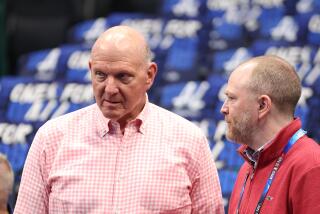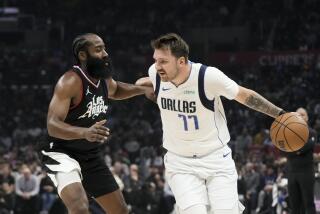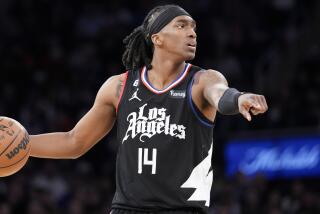YOU CAN GO HOME AGAIN
- Share via
Not many people thought much of Sean Rooks when the Clippers acquired him in a draft-day trade from Dallas for oft-injured point guard Eric Murdock last summer.
Critics considered the deal a wash because Rooks’ stock had dropped after four disappointing seasons of inactivity. Besides, most of the draft-day attention was on the addition of Darius Miles, Keyon Dooling, Quentin Richardson and Corey Maggette.
“The only people who respected me, were people who knew of me as a player before I was a Laker,” said Rooks, 31, who attended Fontana High and played with the Lakers from 1996-97 through 1998-99. “I had a career before the Lakers. I’m not saying that I’m anything special but I can play. . . . There are a lot of one-dimensional players in the league who people praise. But there are not a lot of players who can play the game.”
In his ninth NBA season, Rooks is finally getting the respect he deserves as a backup to starting center Michael Olowokandi. He has been getting plenty of playing time under Coach Alvin Gentry, thanks to Olowokandi’s fouling tendency, but Rooks’ biggest value may be his leadership.
“I’m happy for him because when he first got into the league and played for Dallas, he was a terror,” said Toronto forward Tracy Murray, who has known Rooks since high school when Rooks was a senior and Murray was a sophomore at Glendora.
“He just went to a situation [playing for the Lakers] where he was not used the same way. Now he’s in a situation where he is comfortable and it is good to see.”
Although Rooks’ five-point and four-rebound averages are nothing special, there’s no question that his second chance to play in Los Angeles is going much better with the Clippers than did his first with the Lakers.
“He’s happy playing with the Clippers, even though the team has been losing,” said Rooks’ mother, Deborah Brown.
“He is not as moody as he was when he was with the Lakers. When he was first picked up by them, he was very excited. But somewhere along the line, either he lost the Lakers or the Lakers lost him. It just wasn’t a good experience.”
When he signed a seven-year, $13-million contract in 1996 with the Lakers, the plan was for him to be part of the team’s road to the championship.
“When I signed with the Lakers, Shaq wasn’t there yet but I knew he was coming,” Rooks said about Shaquille O’Neal, who signed as a free agent three days after Rooks had joined the team. “I figured it was cool because they had Shaq and Elden [Campbell] and I figured to be the backup for both of them. I had a pretty good camp and solid preseason and then four games into the season, I was done. They weren’t going to play me.”
Rooks never got comfortable with his ever-changing role with the Lakers, who traded him to Dallas for A.C. Green after three shaky seasons.
“It was a difficult situation because if you play too good, you’re taking minutes from Shaq and he wants to get back in,” Rooks said about his Laker experience. “If you don’t play well, the coach doesn’t want you in.
“Now that I have a different outlook on things, I believe I had a lot to do with it myself. Maybe if I had stayed in shape and ready to go, things may have been different. There’s no doubt that I could have helped the Lakers out, as far as being a backup person, but I fell out of shape and people lost confidence in me. If I had a different frame of mind, I would have done better.”
Rooks didn’t start his NBA career as if he was destined to be a journeyman. After a solid college career playing for Lute Olson at Arizona, he was selected in the second round by Dallas with the 30th overall pick in 1992.
Playing his first two seasons with the hapless Mavericks, who had a 24-140 record during that span, Rooks put up impressive numbers. He averaged 13.5 points and 7.4 rebounds as a rookie and 11.4 points and 5.5 rebounds his second season.
But in the 1994-95 season, things began to sour. Quinn Buckner took over as coach of the Mavericks and moved Darrin Morningstar ahead of Rooks, who soon found himself traded to Minnesota. He got off to a rocky start there, facing Dikembe Mutombo, Hakeem Olajuwon and Patrick Ewing in his first three games.
“I didn’t have great games and a local columnist wrote that the Rooks trade was a bust,” Rooks said. “I hadn’t even been there a week. It’s funny, but superstar players get time to get adjusted and in-between players like me, get dogged and caught in the political crap.”
Late in the 1995-96 season, Rooks was traded to Atlanta, where he again found himself deep on the bench. To his surprise, however, then-coach Lenny Wilkens gave him quality minutes in the playoffs and Rooks produced.
“Atlanta is how I got my [Laker] contract,” Rooks said. “It didn’t matter what I did my first four or five years. . . . I got traded to the Hawks with Christian Laettner and at first, I wasn’t even a thought on the team.
“I wasn’t used much until the playoffs. It was kind of crazy because I was shunned leading up to the playoffs and then they were relying on me. I played well and had a couple of good games against Shaq, even though we were swept by Orlando.”
So when Rooks signed with the Lakers, he thought it was a perfect fit. He was coming off a strong showing in the playoffs and figured the timing was right to return to Southern California, where he’d earned All-Southern Section honors as a high school player. He even turned down a more lucrative offer from Milwaukee to sign with the Lakers.
“After about two weeks into the season and once [then-coach] Del [Harris] told me I didn’t play well in camp, I started pouting,” Rooks said. “When I stopped getting playing time, I had an attitude like, ‘I’m not running and doing all of that extra stuff. I’m getting screwed.’ That’s how I got out of shape.”
Rooks thought things were going to get better for him when Dallas Coach Don Nelson traded Green for him. With a young team like the Mavericks, Rooks figured to get more playing time. Wrong again.
He averaged only 14.1 minutes and 4.4 points along with 3.5 rebounds. But he played enough to attract interest from the Clippers. Not that he much cared.
“When he came back to Los Angeles to join the Clippers, he wasn’t real excited at first,” Brown said. “You know how people are. ‘Oh you play with the Clippers? Wow, that’s too bad.’ Sean heard that a lot. . . . Then after he got there and met Darius [Miles], Quentin [Richardson], [Corey] Maggette and Michael [Olowokandi], he changed when he saw how young they are. . . . I reminded him that I remember when he was Darius. They will look up to you.”
With that advice from his mother, Rooks took on a big-brother role and Gentry couldn’t be happier.
“The most important thing is to be a professional and I believe that’s why Sean has stayed in the league as long as he has,” Gentry said. “The fact he’s a good player is important, but people know that you can count on him, which is very important.
“You can sit him and not play him and then bring him in at any time and have him play well. Everyone around the league knows that.”
With two more seasons on his contract, Rooks is glad to be a part of the Clippers’ latest rebuilding project.
“We’ve come a long way with the young players we have and if you look at our future, it’s bright,” he said. “I want to be a part of the team’s future. It’s not like I’m at the peak of my career. I know I am on the other side of the slide and have only X amount of years left. But I know I can give some good minutes and be positive for the young guys. That’s what I would like to do.”
He knows the Clippers need to improve but he’s patient.
“I tell people all the time, we may not be doing great in the standings but this team wasn’t even assembled until late in the summer,” Rooks said. “We are all new people coming together and when that happens, you are going to struggle. There are so many games we should have won. The little things that you learn to do come from experience playing together. In due time, this could be a good situation to be in.”
Rooks should know. He’s been in enough bad ones and still been able to overcome.
(BEGIN TEXT OF INFOBOX / INFOGRAPHIC)
Sean Rooks in the NBA
Originally selected by the Dallas Mavericks in the second round (30th pick overall) of the 1992 NBA draft, Sean Rooks was signed as a free agent by the Lakers in 1996. He returned to Dallas in 1999 and was traded to the Clippers on June 28, 2000 for Eric Murdock. Rooks’ career statistics:
*--*
Season Team G MPG FG% RPG PPG 1992-93 Dallas 72 29.0 .493 7.4 13.5 1993-94 Dallas 47 26.7 .491 5.5 11.4 1994-95 Minn. 80 30.1 .470 6.1 10.9 1995-96 Atl-Minn. 65 17.2 .505 3.9 6.5 1996-97 Lakers 69 10.7 .470 2.4 3.8 1997-98 Lakers 41 10.4 .455 2.9 3.4 1998-99 Lakers 36 8.8 .405 2.0 2.7 1999-00 Dallas 71 14.1 .431 3.5 4.4 2000-01 Clippers 47 19.5 .427 4.0 5.6 Total 528 19.4 .473 4.4 7.3
*--*
More to Read
All things Lakers, all the time.
Get all the Lakers news you need in Dan Woike's weekly newsletter.
You may occasionally receive promotional content from the Los Angeles Times.






